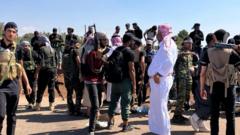Bedouin fighters stationed outside Suweida, southern Syria, confirmed to the BBC their determination to observe a ceasefire with the local Druze community. However, the fighters caution that they may return to hostilities depending on the situation. After a week marked by intense sectarian violence between Druze forces, Bedouins, and government troops, the Bedouins have retreated to surrounding villages. Escalating the conflict, Israel has conducted airstrikes to support the Druze.
A UK monitoring organization has indicated a "cautious calm" in Suweida; however, recent reports reveal attacks by tribal fighters on surrounding villages. In al-Mazara'a, a town that recent Bedouin advances had overtaken, smoke could be seen from a distance as tensions remained high.
At a significant checkpoint on the city's outskirts, armed government personnel prevented Bedouin fighters from returning to Suweida. A crowd of agitated Bedouins gathered, some firing their weapons into the air both in protest and in demand for the release of detained and wounded members whom they call hostages. "We followed the government’s instructions but will return if they don’t comply," stated a tribal elder. "Suweida lies just 35 kilometers away."
Long-standing discord between the Druze and Bedouin groups flared into violence after the kidnapping of a Druze merchant en route to Damascus. Syrian government forces were deployed in response. According to Druze residents, violence intensified as government and foreign combatants targeted civilians. Israeli airstrikes hit hostile forces acting near the Druze community.
The humanitarian crisis escalated, with over 1,120 casualties reported, which includes civilians and combatants. The latest figures reveal that at least 128,000 individuals have been displaced. Conditions in Suweida deteriorate with critical shortages of medical supplies reported. Amidst this chaos, a humanitarian convoy has reportedly managed to reach the city, as Israel provided medical support for the beleaguered Druze citizens.
In a makeshift refugee site in Mia'rbah, Bedouin families expressed mistrust towards the Druze community, emphasizing that peaceful coexistence largely depends on the governance of Damascus. The apprehensions of Bedouin refugees are palpable, as they face the remnants of a fractured society, raising the question of whether they can return to the city of their displacement without governmental authority to ensure peace and security.



















